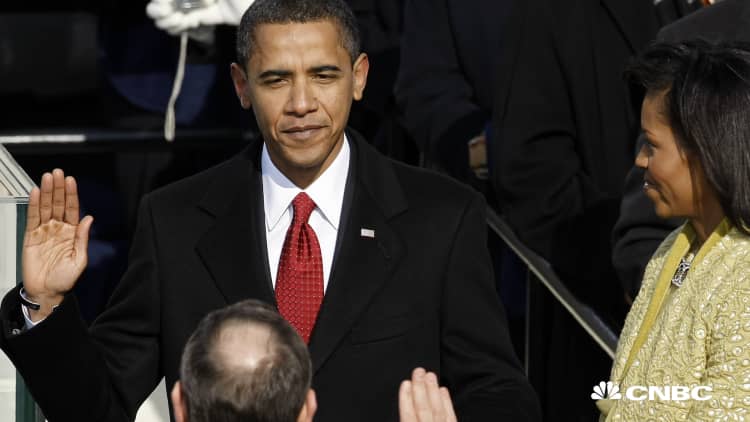Optimism among small-business owners has soared as entrepreneurs hope that President-elect Donald Trump will enact policies aimed at helping them.
Trump has promised to ease regulation. While some on Main Street cheer the goal, changing anything substantial about regulation is easier said than done.
But there are other ways that a Trump administration can make life easier for small businesses. Consider this five-step plan his first 100 days agenda for Main Street.
Encourage large companies and the federal government to hire small businesses
"Trump should create tax requirements to source more from U.S. based small supply chain companies, and use incentives to get companies to pay these suppliers more quickly and invest in them with technology and skills training," says Karen Mills, a senior fellow at the Harvard Business School and former head of the Small Business Administration. She served under President Obama from 2009 to 2013.
"Instead of squeezing their supply chain constantly, large companies, in exchange for enormous tax benefits, should treat their small business suppliers like partners, creating more value and more jobs at home."
Also, Trump should maintain and potentially expand the Small Business Innovation Research (SBIR) program, a competitive awards-based program that aims to encourage small-business owners to pursue technical innovations, says Martin Baily, the Bernard L. Schwartz Chair in Economic Policy Development and a senior fellow in Economic Studies at Brookings.
"This is a program that gets large federal agencies like the DOD [Department of Defense] and NIH [The National Institutes of Health] to provide a percentage of their innovation funding to small businesses," he tells CNBC.
Streamline communications with the government
Communicating with the government is almost always inefficient. But it doesn't have to be.
"Trump needs to double down on the investments in technology made in the last several years, designed to streamline the federal government's interaction with the average consumer and small business owner," says Mills.
Mills recommends making all government forms digitally available with auto-filled required fields so that entrepreneurs don't have to complete the same fields over and over.
Further, the Trump administration can generate a single access point for all government resources for small-business owners. "There should be one website that coordinates the federal, state and local requirements and tells the small employer what they need to pay to which agency," says Baily.
In particular, new hire paperwork requirements are a headache and need to be improved, he says.
Lower taxes for small-business owners
Trump campaigned on the promise that he would lower corporate taxes from 35 percent to 15 percent.
Eighty-three percent of small-business owners are incorporated such that they pay business taxes on their individual tax returns, so to ensure that all entrepreneurs see a reduction in taxes, Trump needs to lower individual income taxes, too, Todd McCracken, president and CEO of the National Small Business Association, tells CNBC.
Centralize and coordinate efforts
McCracken says small-business needs must be prioritized by the Oval Office and plans to help Main Street must be organized on a federal level.
"Elevating small business at every level can start with the White House both through maintaining the cabinet-level position of the Administrator for the U.S. Small Business Administration and through convening a White House Conference on Small Business to develop a cohesive small-business agenda, something that hasn't been done in more than 20 years," says McCracken.
Settle uncertainty around healthcare
Many small-business owners have depended on the Affordable Care Act for coverage, a new report out this week from the Treasury department shows. In fact, one out of five people to get insurance through Obamacare was a small-business owner, self-employed or both.
"Workers value health insurance and small businesses often can't afford to provide it. The option for workers to be able to get insurance through the exchanges should allow many good workers to stay at small businesses rather than seek out an employer who will provide insurance," Dean Baker, economist and co-director of the Center for Economic and Policy Research, tells CNBC.
It's unclear what will happen in coming years, given that "Trump has promised to repeal and replace" the ACA, says Bailey. He suggests that, as an alternative, Trump should keep the Medicaid expansion that was part of Obamacare. That would give low-wage earning employees access to some healthcare.
Mills says any potential replacement needs to provide an option for businesses with more than 50 employees as well as those with fewer. Obamacare has helped many small-business owners, she says: "Now small businesses don't have to worry that their small number of employees makes their risk pool too limited, causing costs to soar if one employee gets sick."



